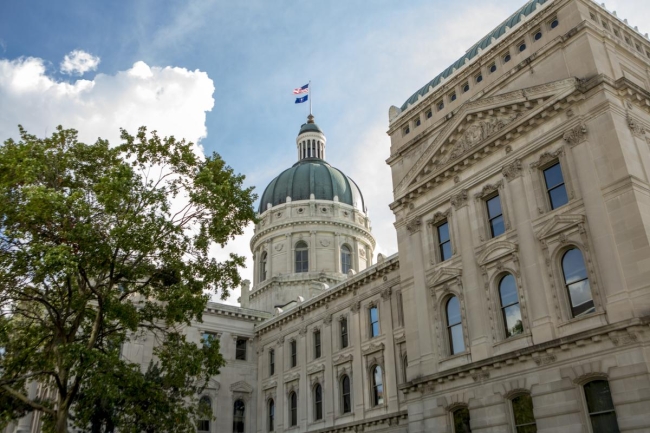You have /5 articles left.
Sign up for a free account or log in.

Indiana is one of seven states that is set to tax forgiven student loans.
JTSorrell/Getty Images
Some of the 43 million Americans who could see some—if not all—of their student loans forgiven this year might need to start saving for a tax bill.
Forgiven debt will be taxed in Arkansas, California, Indiana, Minnesota, Mississippi, North Carolina and Wisconsin unless lawmakers in those states change laws, said Jared Walczak, vice president of state projects for the Tax Foundation. Historically, state and federal governments have taxed debt forgiveness, but Congress added an exemption for student loans discharged through 2025 in the 2021 American Rescue Plan Act. Not all states have since changed their tax laws to align with federal policy, leading to a variety of approaches in how to handle student loan relief.
President Biden unveiled a plan last month to cancel up to $10,000 in student loans for Americans earning less than $125,000 per year or couples who make less $250,000. Pell Grant recipients will receive up to $20,000 in relief.
How much a person could owe in state taxes depends on total income, their state’s tax rates and other factors. Experts expect the loans to result in a couple hundred dollars more in taxes for affected borrowers.
But advocates are optimistic that the money ultimately won’t be taxed in many states.
“The story’s not written yet about which states will or will not,” said Cody Hounanian, executive director of the Student Debt Crisis Center. “We’re very optimistic that many states will take action to make sure that cancellation is not taxed. Because obviously it undermines the value of a policy designed to help working- and middle-class families. I know there’s a lot of fear out there, but we still have many unanswered questions.”
He encouraged borrowers in any of the seven states to speak up and advocate for lawmakers to make debt relief tax-exempt.
Since Biden’s announcement, several states without clear laws on the books about taxing debt forgiveness have said the relief won’t be taxed. Lawmakers in California are pledging to change policies to ensure it is exempt, the Los Angeles Times reported.
Walczak said those lawmakers have a narrow window in which to act, because taxpayers can start filing tax returns early next year. If state officials wait until closer to the April 15 filing deadline, the potential for issuing refunds or requiring filers to file amended returns is greater, he said.
“That’s a headache that everyone would prefer to avoid if they’re going to make this change, so there’s some urgency in changing it if policy makers wish to do so,” he said.
If some states end up taxing the forgiven debt, Walczak said there will be “significant confusion” for taxpayers, and enforcement will be difficult. The Biden administration has directed loan servicers not to issue a 1099-C—the tax form used to declare canceled debt—to individuals who have their debt discharged. Without that form, states won’t be able to easily determine who owes taxes, but taxpayers are still obligated to report the debt as income.
“This is an area where we can expect significant tax underpayments that would require correction but probably don’t make sense to think of in terms of tax fraud,” he said. “These will be, in many cases, honest mistakes. States still pursue honest mistakes.”
He hopes tax-preparation software and tax preparers make the necessary adjustments to ensure that individuals are reporting all their taxable income.
The U.S. Department of Education, which is administering the debt-relief program, has said borrowers will be able to apply for relief in October.
As states began confirming that the canceled loans would be taxed, Hounanian with the debt crisis center said he saw fear and misinformation spreading online, with some suggesting that debt relief was “just another scam to take tax money.”
“This isn’t some sort of bait and switch,” he said. “The president has done his part in canceling student debt at the federal level. Lawmakers in Congress, including Senate Majority Leader [Chuck] Schumer, made sure that federal taxes would not apply here, and now we’ve got to do the work to make sure that states do the same … This is just an issue of complex policy that needs to be straightened out.”
Hounanian said that even if the states don’t change their laws, many of the affected borrowers won’t have a large tax burden. About 90 percent of the borrowers included in Biden’s debt cancellation plan make less than $75,000 a year.
“This is not necessarily going to mean a tax bomb for millions of Americans,” he said. “This is more of a policy discussion right now. We’re going to straighten it out so that no one has to worry about this. This plan is going to reach people who need it most.”








